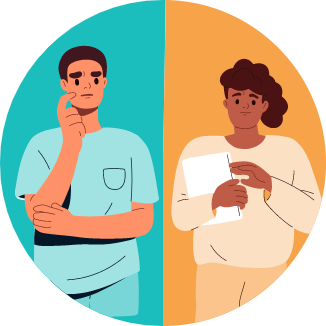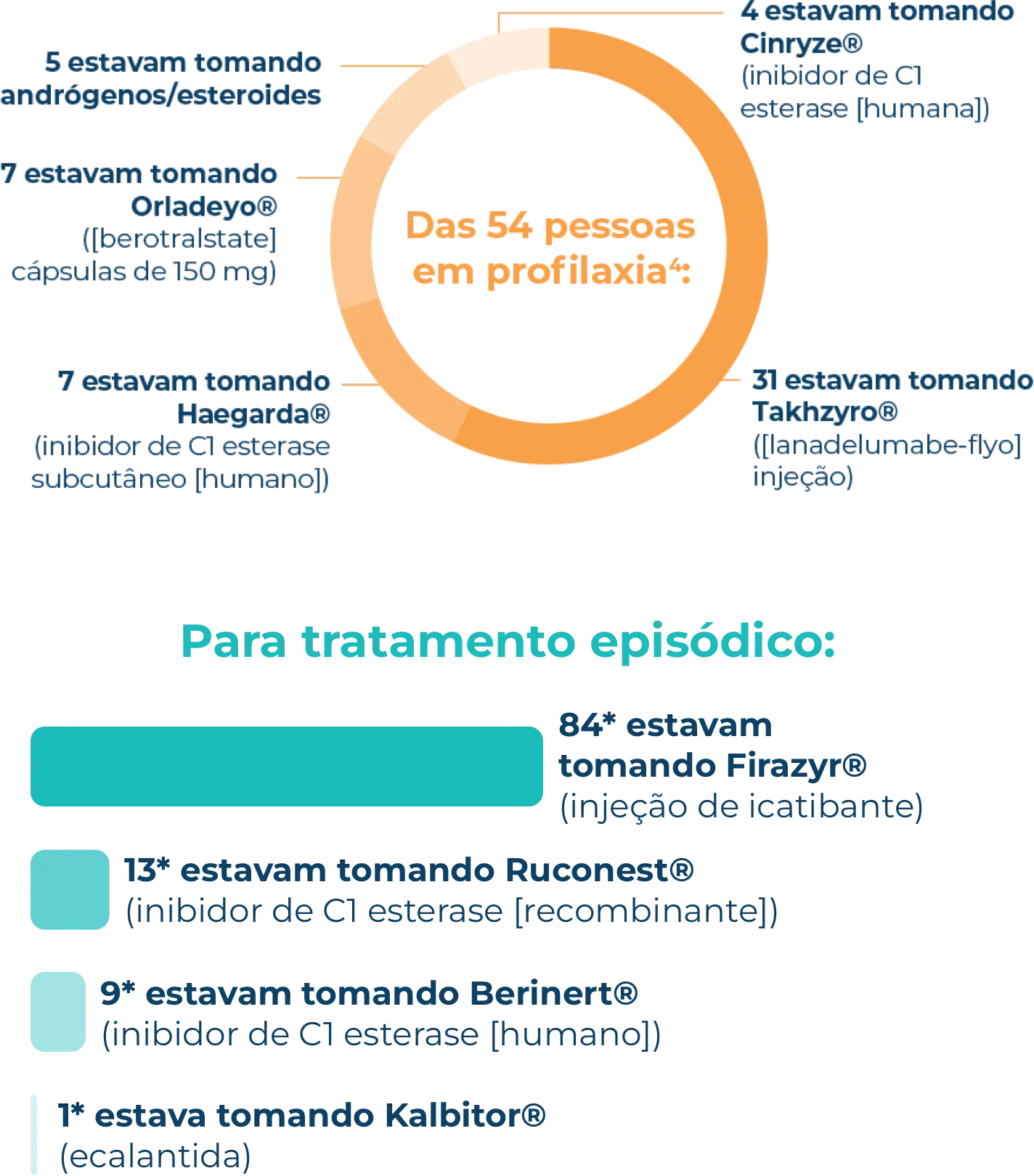Como sua experiência de jornada de crises se compara?
Responda a 5 perguntas para ver se sua experiência é semelhante àquelas da Pesquisa de jornada de crises de AEH.
INICIAR A ExperiênciaResponda a 5 perguntas para ver se sua experiência é semelhante àquelas da Pesquisa de jornada de crises de AEH.
INICIAR A Experiência
A PESQUISA DE JORNADA DE CRISES DE AEH ENTREVISTOU PESSOAS QUE CONVIVEM COM AEH COM O OBJETIVO DE COMPREENDER:


Há ocasiões em que as pessoas que convivem com AEH retardam o tratamento ou decidem não tratar uma crise de AEH. A Pesquisa de jornada de crises de AEH revelou que muitas pessoas que convivem com AEH acham difícil levar o tratamento episódico consigo e enfrentam a ansiedade de tratar ou não ao identificarem uma crise. Falta de privacidade necessária para administrar o medicamento, preferindo tratar em casa e medo de injeção ou dor causada pela medicação são 3 dos motivos mais comuns para adiar o tratamento.
54/107
tratam com
profilaxia

53/107
tratam apenas
episódico

21 participantes
homens
e 86 participantes
mulheres

56 pessoas com
<40 anos
de idade e 51 com
≥40 anos de idade
A Pesquisa de jornada de crises de AEH foi conduzida pela KalVista Pharmaceuticals em parceria com a comunidade de AEH para entender melhor como as pessoas que convivem com AEH planejam para uma crise, tomam decisões sobre o tratamento episódico e como as crises afetam sua qualidade de vida. Esta pesquisa foi baseada nos achados de uma pesquisa piloto anterior (N=32), que revelou que a maioria das pessoas que convivem com AEH continua a ter uma jornada prolongada de crise, apesar dos avanços no tratamento.
A pesquisa foi conduzida on-line de abril a outubro de 2022 e fez perguntas a 107 membros da Associação de Angioedema Hereditário (Hereditary Angioedema Association) sobre crises de AEH e sua atual experiência de tratamento episódico.


*Para Firazyr, 44 pessoas faziam uso de profilaxia e episódico, e 40 estavam recebendo somente episódico; para Ruconest, 3 pessoas faziam uso de profilaxia e episódico, e 10 estavam recebendo apenas episódico; para Berinert, 6 pessoas faziam uso de profilaxia e episódico, e 3 estavam recebendo apenas episódico; para Kalbitor, 1 pessoa fazia uso de profilaxia e episódico, e 0 estava recebendo apenas episódico. Cinryze, Firazyr, Kalbitor e Takhzyro são marcas registradas da Takeda ou de suas afiliadas. Berinert e Haegarda são marcas registradas da CSL Behring GmbH. Orladeyo é uma marca registrada da BioCryst Pharmaceuticals, Inc. Ruconest é uma marca registrada da Pharming Intellectual Property, B.V.
Preparação para uma crise:
As pessoas que convivem com AEH perdem oportunidades de tratar as crises precocemente
IDENTIFICAÇÃO DA CRISE:
AS PESSOAS QUE CONVIVEM COM AEH PODEM IDENTIFICAR CONSISTENTEMENTE O INÍCIO DE SUAS CRISES
Tomada de decisão:
APESAR DE RECONHECER O
INÍCIO DE UMA CRISE DE AEH, QUASE TODOS OS ENTREVISTADOS
ADIAM O
TRATAMENTO EPISÓDICO
RESOLUÇÃO:
O ATRASO DO TRATAMENTO EPISÓDICO AFETOU A GRAVIDADE DA CRISE E O TEMPO DE RECUPERAÇÃO
Participe da conversa e seja o primeiro a saber sobre atualizações futuras.
PUBLICAÇÕES SOBRE JORNADA DE CRISES DE AEHReferências: 1. Valerieva A, van Kooten S, Heckmann M, Danese S, Goga L, Longhurst H. Patients delay treating hereditary angioedema (HAE) attacks with currently available, injectable, on-demand therapies. Resumo apresentado no: Congresso Híbrido EAACI 2023, de 9 a 11 de junho de 2023; Hamburgo, Alemanha. Allergy. In Press. 2. Betschel S, van Kooten S, Heckmann M, Danese S, Goga L, Guilarte M. HAE Patients Decision to Carry On-demand Treatment When Away from Home. Resumo apresentado no: 13.º Workshop sobre Deficiência de inibidores de C1 e Angioedema, 4 a 7 de maio de 2023; Budapest, Hungria. Allergy Asthma Clin Immunol. In Press. 3. Grumach A, van Kooten S, Heckmann M, Danese S, Goga L, Garcez T. Understanding the complex decision-making associated with on-demand treatment of hereditary angioedema (HAE) attacks. Resumo apresentado no: Congresso Híbrido EAACI 2023, de 9 a 11 de junho de 2023; Hamburgo, Alemanha. Allergy. In Press. 4. Burnette A, Anderson J, Longhurst H, et al. Anxiety associated with parenteral on-demand treatment for hereditary angioedema (HAE). J Allergy Clin Immunol. 2023;151(2):AB141. doi:10.1016/j.jaci.2022.12.441 5. Dados em arquivo. KalVista Pharmaceuticals, Inc. 2023.

voltar ao topo